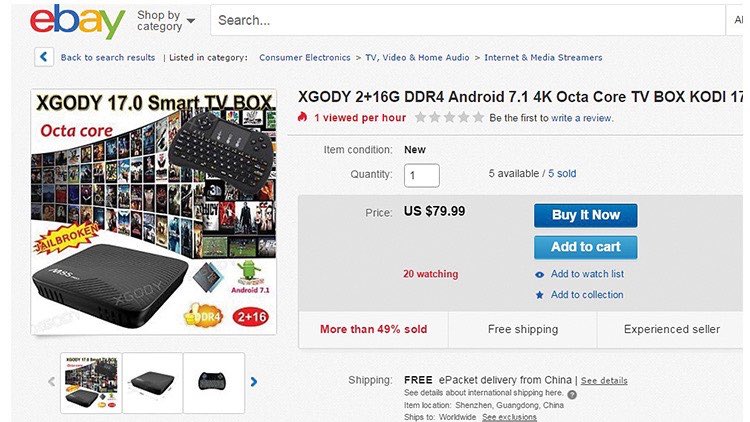‘Fully-Loaded’ Kodi Boxes Becoming Bigger Piracy Threat

The smarter way to stay on top of broadcasting and cable industry. Sign up below
You are now subscribed
Your newsletter sign-up was successful
A media player that offers consumers a way to purloin premium content poses a growing piracy threat to both programmers and distributors, according to a new study from bandwidth-management specialist Sandvine.
According to anonymous, network-level data captured from more than 250,000 homes that get service from multiple tier-1, fixed-line North American internet-service providers, Sandvine said about 8.8% of homes in the region have at least one Kodi device with an active installation, and that the majority of those homes (68.8%) use an unofficial add-on configuration that enables the devices to access unlicensed content.
Sandvine’s further math-crunching suggests that about 6% of all homes in North America have a Kodi device in some sort of content piracy mode.
Kodi, also known as XBMC, is open-source media-player software that allows users to access and view local media and to stream remote media, including video, music and photos. Though local content streaming was Kodi’s primary application, users are increasingly using add-on modules to enable remote streaming, which is typically used to obtain unauthorized content.
Sandvine stresses that Kodi, as a free piece of software, is in itself benign from a piracy standpoint. Rather, add-ons made by individuals are the issue. It’s also fairly easy for Kodi to run on relatively inexpensive Android phones, tablets and TV-connected streaming devices.
“Kodi simply serves as a front end; If Kodi disappeared tomorrow, then all of the content made available through the unofficial add-ons would quickly be made be accessible via a web browser, or by another media player, and the parties that are benefitting today (except possibly the ‘fully loaded’ Kodi box sellers) would continue to profit,” Sandvine said.
Consumers have also been able to buy fully loaded Kodi hardware/boxes through sources such as Facebook, Craigslist and Kijiji, that are morphed into aggregators of unlicensed content from a wide range of sources.
The smarter way to stay on top of broadcasting and cable industry. Sign up below
Those add-ons “act like a user interface for an address book that knows where to find content that’s distributed throughout a range of Internet storage services,” Sandvine said.
An example is an add-on known as Exodus, which a user taps to watch a video, and the add-on then connects to an aggregator site that tracks where copies of the requested video is stored. In turn, the aggregator site shows a list of available files on the Kodi user interface that are then selectable for streaming or playback by the end user.
While there are some free add-ons that provide access to content with questionable video quality (some users take advantage of free cloud storage offered by companies such as Google, Microsoft and Dropbox), other paid services have emerged that deliver higher quality live and on-demand video.
The average price for these services is about $10 per month, Sandvine noted, and the party selling the Kodi box might also get a small cut of the fee.
‘HEARTBEAT’ EASY TO HEAR
Sandvine said the Kodi app doesn’t generate a lot of traffic, but notes that the activity is simple to detect in a home by monitoring an easily identified Kodi “heartbeat” coming from a PC, smartphone, tablet or set-top box in a home.
Sandvine said it released the report to help service providers and others understand the origin of unlicensed content in a way that allows them to work with law enforcement and to ensure that their license rights are upheld.
Though the use of fully loaded Kodi boxes isn’t making a lot of headlines in the U.S., it’s a different story in some other parts of the world, where courts are trying to crack down on the sale of these fully-loaded devices.
In March, Canada’s Federal Court of Appeal in Montreal upheld a ban that prevents the sale of those fully loaded devices. That action came after several service providers, including Rogers Communications, Bell Canada and Vidéotron, took legal aim at sellers of preconfigured devices that enabled access to valuable, unlicensed content, TorrentFreak reported.
In April, the European Court of Justice also found that the streaming of copyrighted material via fully-loaded Kodi boxes and other similar types of media players is illegal in European Union member states. It found that “temporary acts of reproduction, on that multimedia player, of a copyright protected work obtained by streaming on a website belonging to a third party offering that work without the consent of the copyright holder, cannot be exempted from the right of reproduction.”
